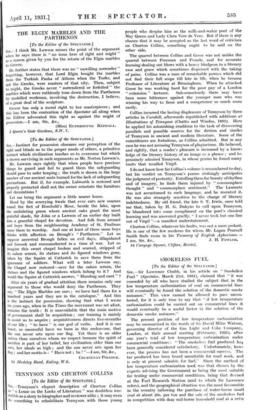TENNYSON AND CHURTON COLLINS
[To the Editor of the SPECTATOR.] Sm,—Tennyson's elegant description of Churton Collins as " a Louse on the Locks of Literature " was doubtless irre- sistible as a story to biographer and reviewer alike.; it may even do something to rehabilitate Tennyson with those young
people who despise him as the milk-and-water poet of the May Queen and Lady Clara Vere de Vere.. But if there is any chance that it may be accepted as the last word of criticism on Churton Collins, something ought to be said on the - other side.
The quarrel between Collins and Gosse was not unlike the quarrel between Freeman and Froude, zeal for accurate - learning dealing out blows with a heavy bludgeon to a literary ease and grace which sometimes dispensed with the taking of pains. Collins was a man of remarkable powers which did not find their full scope till late in life, when he became Professor of Literature at Birmingham. When he attacked Gosse he was working hard for the poor pay of a London " extension " lecturer. Sub-consciously there may have been some bitterness against the younger man who was winning his way to fame and a competence' so much more
easily. •
Collins incurred the lasting displeasure of Tennyson by three articles in Cornhill, afterwards republished with additions as Illustrations of Tennyson (Chatto and Windus, 1891). Here he applied his astonishing erudition to the task of discovering parallels • and possible sources for the diction and similes of Tennyson in ancient and modern literature. Some of the coincidences are fortuitous, as Collins admitted. But in any case he was not accusing Tennyson of plagiarisms. He believed, and rightly, that a reader's pleasure is increased by a know- ledge of the literary history of an image or a phrase ; and he genuinely admired Tennyson, in whose genius he found many traits that recalled Virgil.
I do not know how far Collins's volume is remembered to-day, but his verdict on Tennyson's poems strikingly anticipates the judgment of posterity. Extollingthem for beauty of rhythm and of imagery, he finds them injured by " commonplace thought " and " commonplace sentiment." The Laureate was not accustomed to such language, and he resented it He was also strangely sensitive to the charge of literary indebtedness. My old friend, the late S. T. Irwin, once told me that, taken by H. G. Dakyns to call upon Tennyson, he blundered into some compliment on the poet's classical learning and was answered gruffly, " I never took but one line out of Virgil "—a manifest understatement.
Churton Collins, whatever his faults, was not a mere pedant. He is one of the few moderns for whom Mr. Logan Pearsall Smith finds room in his Treasury of English Aphorisms.—










































 Previous page
Previous page